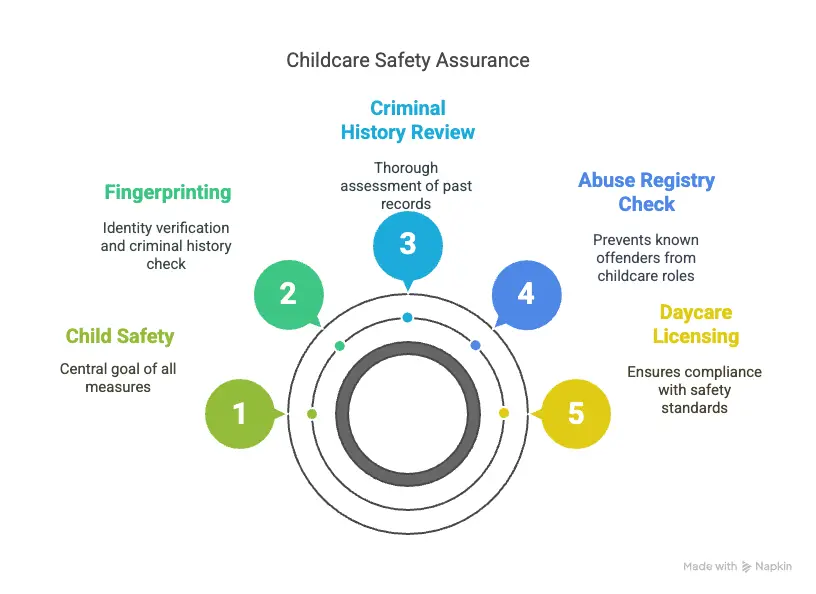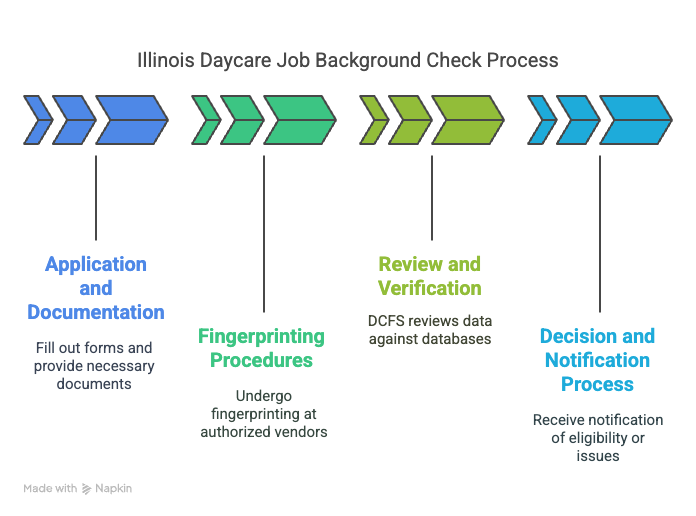Ensuring the safety and well-being of children in daycare settings is a top priority for Illinois' Department of Children and Family Services (DCFS). To uphold these standards, DCFS mandates comprehensive background checks for all childcare workers. Whether you're a daycare owner, aspiring childcare worker, or concerned parent, understanding these requirements is crucial. This guide will delve into the Illinois daycare background checks, outline the role of DCFS, and break down the steps and requirements for ensuring a safe environment for children.
Key Takeaways
- Background checks in Illinois daycares include fingerprinting and criminal history reviews to ensure worker suitability.
- The DCFS enforces rigorous standards, ensuring daycare workers are thoroughly vetted to protect children.
- Essential components of the checks include identity verification, criminal assessments, and abuse registry checks.
- Understanding the process, such as application and documentation, helps job seekers prepare effectively.
- Awareness of legal rights and compliance with state and federal laws is crucial to protect both employers and employees during the hiring process.
Introduction
Safety in daycare is critical. Background checks are the backbone of this security. They ensure that those entrusted with childcare have passed rigorous examination. Illinois takes these safeguards seriously. The Department of Children and Family Services (DCFS) requires comprehensive screening.
Background checks aren't just paperwork. They consist of careful procedures designed to protect children. They include fingerprinting, criminal history assessments, and abuse registry checks. The DCFS is central to this process. Their regulations guide how checks are run, making sure standards are consistent and thorough.
This article is here to clear up how background checks work. Whether you're hiring, job-seeking, or a parent, it will help you navigate this system. You'll better understand what's required to maintain a safe environment for children in Illinois daycare facilities.
Understanding Illinois Daycare Background Checks
Illinois daycare background checks are more than just a formality; they are a necessary step in safeguarding children. These checks involve examining an individual's criminal history, checking the Illinois Sex Offender Registry, and reviewing other relevant databases. They ensure that the staff involved in childcare are trustworthy and safe. These checks aim to identify any criminal convictions, especially those related to child abuse or neglect, which could disqualify an individual from working with children.
The Illinois Department of Children and Family Services (DCFS) plays a crucial role in overseeing daycare background checks. As the regulatory body, DCFS sets the standards and procedures that facilities must follow. It ensures that every childcare worker undergoes comprehensive screening. The goal is straightforward: maintain a safe environment for kids. By mandating these checks, DCFS holds daycare centers to a high standard, ensuring every person in contact with children has been thoroughly vetted.
Understanding these requirements is essential for anyone involved with daycare facilities, whether you operate one or work in one. Knowing the background check process helps you meet legal obligations and protect the children in your care.
Key Components of the Background Check
Fingerprinting is an essential step in the Illinois DCFS background check process. It helps confirm the identity of childcare workers and checks their criminal history. Fingerprinting captures unique patterns, ensuring accuracy in matching individuals with their records. By submitting fingerprints to state and federal databases, any previous convictions or charges are identified. This is crucial for maintaining safety in childcare settings.
The screening process for childcare workers goes beyond fingerprinting. It includes a thorough review of criminal history. Employers also verify past employment to ensure experience and qualifications are legitimate. These checks are critical in assessing whether an individual poses any potential harm to children.

An important tool in this process is the Illinois Abuse Registry Check. It lists individuals who have been substantiated for child abuse or neglect. Checking this registry helps prevent offenders from working in environments where they could harm children. This step adds an extra layer of protection by excluding those who have hurt children before.
Lastly, background checks play a central role in daycare licensing. They ensure that all employees meet the state's safety standards. This not only protects children but also reassures parents that the daycare is committed to safety and trustworthiness. Meeting these requirements is key to securing a license and building a reliable childcare facility.
The Background Check Process
You're about to embark on the process of securing a daycare job in Illinois. Understanding the background check procedure is crucial. Let's break it down step by step for you.

Application and Documentation: Begin with the application process. You'll need to fill out specific forms that request personal information. Prepare to provide identification, previous employment details, and consent for the background check. Accuracy matters—double-check your entries to avoid unnecessary delays.
Fingerprinting Procedures: Next, you'll move on to fingerprinting. This step is required for a thorough check against state and federal criminal records. The Illinois DCFS partners with authorized vendors for this process. You'll visit one of these locations, where professionals will take your fingerprints electronically. The cost usually ranges from $30 to $50, depending on the vendor. Keep the receipt for your records.
Review and Verification: After fingerprinting, the collected data will be forwarded to the DCFS for review. They will cross-reference your information with criminal databases and the Illinois Child Abuse and Neglect Tracking System. This ensures that individuals with harmful histories are identified and prevented from working with children.
Decision and Notification Process: Once the review is completed, the decision phase begins. If cleared, you will receive a notification of your eligibility for employment. DCFS will contact you if there are any issues, and you can contest any discrepancies through a specified process. Knowing the outcome promptly helps you proceed with confidence or address any concerns efficiently.
Legal Considerations and Compliance
Navigating the world of background checks means understanding both state and federal laws. In Illinois, you must comply with various regulations ensuring checks align with legal standards. Awareness of guidelines set by the Equal Employment Opportunity Commission (EEOC) is crucial. These guidelines help prevent discrimination based on race, religion, or other protected characteristics during the hiring process. Checking the EEOC Guidance offers clarity on these issues.
As an applicant, you have rights. If a background check raises red flags, you can contest inaccuracies. The Fair Credit Reporting Act (FCRA) gives you the right to be informed if information in your report prevents your hiring. You can also access the report to verify its accuracy.
Confidentiality is vital. Employers must handle your data carefully. Data protection laws dictate that sensitive information should stay secure and private. Only authorized personnel should access it.
These legalities ensure fair practices and protect both employers and employees. Are you familiar with your rights, or the procedures your potential workplace must follow to maintain compliance? Understanding these elements supports a fair and safe hiring process.
Challenges and Common Concerns
Navigating the background check process can be challenging, and several common issues often arise. The first potential problem is false positives or mistakes in the reports. Errors can occur during data entry or from outdated information in databases. If you believe there’s a mistake in your background check, you should promptly contact the agency responsible for the report. Provide documentation to support your claim.
Delays in processing can be another frustration. These can stem from incomplete applications, missing documents, or high volumes of requests at certain times. Staying proactive helps; ensure all required documents are complete and submitted on time. Keep track of your application status through the appropriate channels, and consider reaching out to DCFS for updates if necessary.
Facing a negative result on a background check is daunting. While it might mean losing a job opportunity, you do have options. You're entitled to receive a copy of the report to identify the specific issues. Dispute any inaccuracies by providing evidence or context for items on your record. For certain offenses, time and proof of rehabilitation may allow a second chance. If denied employment, understand the reason and explore if it can be rectified or appealed.
Recognizing these challenges helps you prepare for the process and address issues effectively. Taking the right steps can ease your journey through the background check maze and support your goal of working in a childcare setting.
Conclusion
Background checks for daycare workers in Illinois are more than a formality; they are essential for ensuring child safety. The process involves thorough checks, including fingerprinting, criminal history, and abuse registry reviews. These checks are integral to the daycare licensing process and help build a trustworthy environment for children.
Adhering to DCFS requirements is not just about compliance. It’s about maintaining a community standard that prioritizes the well-being of the most vulnerable. Each daycare owner, worker, and parent plays a crucial role in upholding these standards and ensuring children have a safe place to grow and learn. As you navigate this process, remember, every step taken towards thorough checks is a step towards safeguarding children's futures.
Additional Resources
Finding the right resources can make a big difference when navigating Illinois daycare background checks. Here are some useful links and materials to deepen your understanding.
For more on background checks and HR-related topics, consider visiting our blog. You'll find insights tailored to help both seasoned and new employers manage hiring processes effectively.
External Resources
- EEOC Guidance: The Equal Employment Opportunity Commission provides comprehensive information on compliance with background check laws. Visit the EEOC Guidance for detailed guidelines on what employers should know when conducting checks.
- Illinois DCFS Website: The Department of Children and Family Services outlines specific state requirements for childcare worker checks. Their site can help clarify roles and regulations crucial for anyone involved in childcare.
- Illinois State Police Fingerprinting Information: If you need specifics on fingerprinting facilities and costs, the Illinois State Police offers details on what you should prepare for and expect during the process.
Engaging with these resources will provide you with a clearer view of how background checks work within the daycare sector in Illinois. Do these resources point you in the right direction or clarify any remaining questions you might have?
Frequently Asked Questions (FAQs)
What disqualifies you from daycare work in Illinois?
A history of certain criminal offenses disqualifies you, including violent crimes, sexual offenses, and serious drug-related charges. DCFS also reviews past child abuse or neglect reports.
How long do Illinois DCFS background checks take?
Typically, it takes about 30 days. However, this can vary based on the volume of applications and the thoroughness of checks required.
Are Illinois daycare volunteers required to have background checks?
Yes, volunteers must undergo background checks to ensure the children's safety.
Does Illinois check out-of-state abuse registries?
Yes, Illinois reviews out-of-state abuse registries as part of the background check process.
Can a DUI affect daycare employment in Illinois?
Yes, a DUI may impact your ability to work in daycare, depending on the details and timing of the offense.
How to appeal a DCFS background check denial in Illinois?
You can request an appeal by submitting a written request to DCFS. Follow the guidelines provided in your denial letter.
Are expunged records visible to DCFS in Illinois?
No, expunged records are typically not accessible to DCFS during background checks.
Do Illinois home daycares need background checks?
Yes, home daycare providers must complete background checks to ensure all residents comply with legal requirements.
What’s the cost of DCFS fingerprinting in Illinois?
The cost can vary, but it generally ranges from $30 to $50. It's best to check with DCFS or the fingerprinting agency for the current fee.
Can you work in daycare with a misdemeanor in Illinois?
It depends on the nature and recency of the misdemeanor. Some offenses may not disqualify you, while others might.
What is the process for updating your background check information?
To update, notify DCFS with the required documentation showing changes in your record or personal details.
How often do background checks need to be renewed?
Daycare workers in Illinois may need renewed checks every five years or if there is a significant change in personal information.
Do part-time daycare employees need to undergo background checks?
Yes, all employees, regardless of their work hours, must complete background checks.
Can juvenile records affect daycare employment eligibility?
Juvenile records are generally not considered unless they involve serious criminal offenses.
Definitions
Background Check
A background check is a structured review of a person’s history. Employers use it to verify information such as criminal records, past employment, and abuse registry status. In Illinois daycare settings, background checks help determine if someone is eligible to work with children. The process often includes fingerprinting, identity confirmation, and cross-checking with national and state databases.
Fingerprinting
Fingerprinting is the process of collecting and recording a person's unique fingerprint patterns. These prints are submitted to law enforcement databases to check for past criminal activity. For daycare jobs in Illinois, it’s a required step that helps match individuals with their official records and verify their identity during hiring.
Criminal History
Criminal history refers to a person's past arrests, charges, and convictions. Employers review this information to assess whether someone poses a risk in a caregiving role. In Illinois daycare employment, certain offenses—like crimes against children—can immediately disqualify an applicant. Knowing your history helps you prepare for any potential concerns.
Child Abuse Registry
The child abuse registry is a list that tracks individuals who have been substantiated in cases of child abuse or neglect. Employers in child care settings check this registry to ensure applicants haven’t harmed children in previous roles. A record here often leads to disqualification, as safety is a top priority.
Equal Employment Opportunity Commission (EEOC)
The EEOC is a federal agency that enforces laws against workplace discrimination. It protects applicants and employees from unfair treatment based on race, sex, religion, or other protected traits. When conducting background checks, employers must follow EEOC guidelines to ensure hiring decisions are fair and lawful.
References
- DCFS Day Care Criminal Background Checks Notice: https://dcfs.illinois.gov/content/dam/soi/en/web/dcfs/documents/about-us/policy-rules-and-forms/documents/notices/notice-to-providers-day-care-background-checks.pdf
- DCFS Clarification on Background Checks (Feb 2025): https://backgroundcheckportal.dcfs.illinois.gov/FileManager/Download/Help/2025-01-clarification-of-persons-subject-to-background-checks-for-agencies-and-institutions-it.pdf
- Accurate Biometrics (DCFS Info): https://accuratebiometrics.com/dcfs-illinois
- Illinois General Assembly (SB2446): https://www.ilga.gov/legislation/104/SB/10400SB2446.htm

GCheck Editorial Team
Meet the GCheck Editorial Team, your trusted source for insightful and up-to-date information in the world of employment background checks. Committed to delivering the latest trends, best practices, and industry insights, our team is dedicated to keeping you informed.
With a passion for ensuring accuracy, compliance, and efficiency in background screening, we are your go-to experts in the field. Stay tuned for our comprehensive articles, guides, and analysis, designed to empower businesses and individuals with the knowledge they need to make informed decisions.
At GCheck, we're here to guide you through the complexities of background checks, every step of the way.





